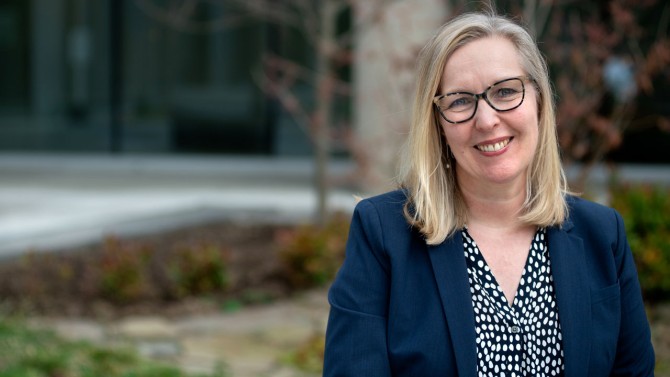Center for Immunology connects Cornell strengths
By Krishna Ramanujan
Since opening in 2019, the Cornell Center for Immunology has provided a hub that connects the university’s strengths in immunology across multiple departments, colleges and with Weill Cornell Medicine in New York City through seed grant programs, symposia and faculty recruiting.
The center, with more than 120 faculty members, builds on the multidisciplinary nature of research into the immune system, with links between infection biology, vaccine development, genetics, genomics, malignancy and biomedical engineering.
“One very big incentive for me coming here was the Center for Immunology, which creates a cross-campus initiative that brings the immunology community together,” said Deborah Fowell, professor and chair of the Department of Microbiology and Immunology and the center’s new co-director. Fowell, herself a key recruit, has served on the center’s executive committee since arriving at Cornell in 2020 from the University of Rochester, where she was the dean’s professor of microbiology and immunology.
“The center isn’t working as a silo, it’s really working collaboratively with other entities,” said Dr. Gary Koretzky ‘78, who established and co-directs the center and is professor of medicine at Weill Cornell Medicine. Koretzky also holds an appointment in the Department of Microbiology and Immunology and serves as vice provost for academic integration.
With synergies in mind, the center has worked with departments to identify recruits who will grow cross-disciplinary expertise.
Fowell’s own research, for example, focuses on the spatiotemporal regulation of T cell immunity at tissue sites of infection and inflammation. To study these areas, she conducts imaging of live subjects, using advanced imaging tools such as multiphoton microscopy and optogenetics to visualize and manipulate T cells in action. Her expertise has fostered collaborations with imaging specialists in biomedical engineering.
Additional recruits have included:
- Andrew Flyak, assistant professor in the Department of Microbiology and Immunology and a Radical Collaboration hire (effective July 1), who uses structural techniques to develop novel vaccine solutions capable of eliciting potent antibodies against viral pathogens. He will provide a link between immunology and structural biology expertise at Cornell.
- Colleen Lau, assistant professor in the Department of Microbiology and Immunology and a Radical Collaboration hire (effective July 1), who works to identify transcriptional signatures for immunological memory. Her research lies at the intersection of immunology and genomics.
- Mandy McGeachy, associate professor in the Department of Microbiology and Immunology (effective July 1), pioneered early studies on a type of T cells called Th17s and continues to define the role of Th17 cells in maintaining tissue homeostasis and in response to infectious and autoimmune disease.
- Shaoyi Jiang, Ph.D. ‘93, the inaugural Robert S. Langer ’70 Family and Friends Professor in the Nancy E. and Peter C. Meinig School of Biomedical Engineering (hired in 2020), works to create substances that can be used in the human body for drug delivery, cancer immunotherapy, and more without provoking an immune system response.
- Anushka Dongre, assistant professor in the Department of Biomedical Sciences (hired in 2021), works at the interface of cancer biology and immunology and examines drivers of resistance to anti-tumor immunity and immune checkpoint blockade therapy in breast cancers.
- Sarah Caddy, member of the Baker Institute for Animal Health and associate professor in the Department of Microbiology and Immunology (effective July 1), a veterinarian with a doctorate in molecular virology who works on how antibodies provide protection from viral infection, with a particular interest in rotavirus and the impact of maternal antibodies on infant responses to vaccination.
Along with recruitments, the center has worked to build channels of communication and collaboration across the university. These include a new seed grant opportunity for investigators working collaboratively at the nexus of genomics and immunology, and a recent intercampus immunology symposium, which focused on key themes of tissue immunity, immunogenomics and the microbiome. Working group discussions brought together scientists to assess Cornell’s strengths, to identify collaborative opportunities and to determine additional investments that would drive success. The center and the Cornell Institute of Host-Microbe Interactions and Disease also jointly support trainee activities, events and opportunities, including travel grants. In addition, the center hosts A.D. White Professor-at-large Ellen Rothenberg.
The new Atkinson Hall, expected to open in 2024, will contain office and lab space for center faculty and staff.
“It will provide us with a physical anchor for our initiatives, strategically positioned in between major research groups on the Ithaca campus,” Fowell said. “It will also be populated by new cross-disciplinary recruits. I see it as a great opportunity to have a meeting place for people from varied backgrounds to stimulate new ideas and foster novel discoveries.”
Media Contact
Get Cornell news delivered right to your inbox.
Subscribe

